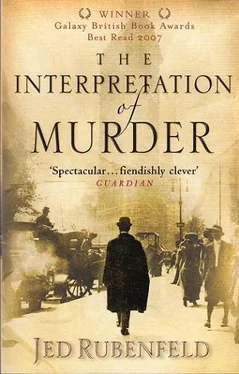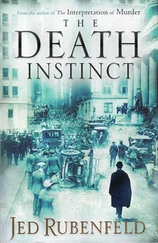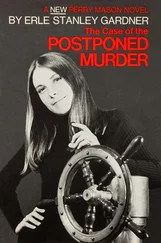Jed Rubenfeld - The Interpretation of Murder
Здесь есть возможность читать онлайн «Jed Rubenfeld - The Interpretation of Murder» весь текст электронной книги совершенно бесплатно (целиком полную версию без сокращений). В некоторых случаях можно слушать аудио, скачать через торрент в формате fb2 и присутствует краткое содержание. Жанр: Исторические приключения, на английском языке. Описание произведения, (предисловие) а так же отзывы посетителей доступны на портале библиотеки ЛибКат.
- Название:The Interpretation of Murder
- Автор:
- Жанр:
- Год:неизвестен
- ISBN:нет данных
- Рейтинг книги:5 / 5. Голосов: 1
-
Избранное:Добавить в избранное
- Отзывы:
-
Ваша оценка:
- 100
- 1
- 2
- 3
- 4
- 5
The Interpretation of Murder: краткое содержание, описание и аннотация
Предлагаем к чтению аннотацию, описание, краткое содержание или предисловие (зависит от того, что написал сам автор книги «The Interpretation of Murder»). Если вы не нашли необходимую информацию о книге — напишите в комментариях, мы постараемся отыскать её.
The Interpretation of Murder — читать онлайн бесплатно полную книгу (весь текст) целиком
Ниже представлен текст книги, разбитый по страницам. Система сохранения места последней прочитанной страницы, позволяет с удобством читать онлайн бесплатно книгу «The Interpretation of Murder», без необходимости каждый раз заново искать на чём Вы остановились. Поставьте закладку, и сможете в любой момент перейти на страницу, на которой закончили чтение.
Интервал:
Закладка:
'She kills herself because her father died — her stupid, pointless father. Would you kill yourself if your father died?'
'My father did die.'
Her hand shot to her mouth. 'Forgive me.'
'And I did kill myself,' I added. 'I don't see what's so unusual about it.'
She smiled.
'When you think about yesterday's events, Miss Acton, what comes to mind?'
'Nothing comes to mind,' she said. 'I believe that's what it means to have amnesia.'
The girl's resistance did not surprise me. The one piece of advice Freud had given me was not to be put off too easily. In hysterical amnesia, some deeply forbidden and long-forgotten episode from the patient's past, stirred into life by a recent event, presses at her consciousness, which in turn fights back with all its strength to keep out the inadmissible memory. Psychoanalysis takes the side of memory against the forces of suppression; it therefore provokes immediate and sometimes intense hostility.
'There is never nothing in one's mind,' I said. 'What is in yours, at this moment?'
'Right now?'
'Yes: don't reflect; just speak it.'
'All right. Your father didn't die. He committed suicide.'
There was a momentary silence. 'How did you know that?'
'Clara Banwell told me.'
'Who?'
'George Banwell's wife,' she said. 'Do you know Mr Banwell?'
'No.'
'He is a friend of my father's. Clara took me to the horse show last year. We saw you there. Were you at Mrs Fish's ball last night?'
I acknowledged the fact.
'You are wondering if my family was invited,' she said, 'but you are afraid to ask, for fear that we were not.'
'No, Miss Acton. I was wondering how Mrs Banwell knew the circumstances of my father's death.'
'Is it awkward when people know?'
'Are you trying to make things awkward?'
'Clara says all the girls find it fascinating — your having a father who killed himself. They think it gives you soul. The answer is that we were invited, but that I would never go to one of your balls in a thousand years.'
'Really?'
'Yes, really. They are sickening.'
'Why?'
'Because they are so — so tiresome.'
'They are sickeningly tiresome?'
'Do you know what a debutante is made to do, Doctor? First, together with her mother, she must call on all her mother's acquaintance — perhaps a hundred houses. I doubt you can imagine how excruciating that is. In every house, the women invariably comment on how "grown up" you look, by which they mean something — quite disgusting. When the grand day arrives, you are exhibited like a talking animal on whom conversational open season has been declared. Then you are forced to endure a cotillion at which every man believes he has a right to make love to you, no matter who he is, no matter how old, no matter how bad his breath. And I haven't even gotten to having to dance with them. I'm starting college this month; I will never come out.'
I chose not to respond to this disquisition, which on the whole seemed quite persuasive. Instead I said, 'Tell me what happens when you try to remember.'
'What do you mean, "what happens"?'
'I want you to tell me whatever thought or image or feeling comes to you when you try to remember what happened yesterday.'
She took a deep breath. 'Where the memory should be, there is a darkness instead. I don't know how else to describe it:
'Are you there, in the darkness?'
'Am I there?' Her voice quieted. 'I think so.'
'Is anything else there?'
'A presence.' She shuddered. 'A man.'
'What does the man make you think of?'
'I don't know. It makes my heart beat faster.'
'As if you had something to fear?'
She swallowed. 'To fear? Let me think. I have been attacked in my own house. The man who attacked me has not been caught. They do not even know who it was. They believe he may yet be watching my house, planning to kill me if I return. And your penetrating question is whether I have something to fear?'
I should have been more sympathetic, but I decided to loose the one arrow I had. 'This was not the first time you lost your voice, Miss Acton.'
She frowned. I noticed, for some reason, the graceful oblique lines of her chin and profile. 'Who told you that?'
'Mrs Biggs told the police yesterday.'
'That was three years ago,' she replied, coloring slightly. 'It is absolutely unconnected to anything.'
'You have nothing to be ashamed of, Miss Acton.'
'I have nothing to be ashamed of?'
I heard the emphasis on I but could not decipher it. 'We are not responsible for our feelings,' I replied. 'Therefore no feeling can cause us shame.'
'That is the least perceptive remark I have ever heard in my life.'
'Oh, really?' I answered. 'What about when I asked if you had something to fear?'
'Of course feelings can cause people shame. It happens all the time.'
'Are you ashamed of what happened when you lost your voice the first time?'
'You have no idea what happened,' she said. Although she didn't sound it, she seemed suddenly fragile.
'That is why I am asking.'
'Well, I am not going to tell you,' she replied, and rose from the sofa. 'This is not medicine. It is — it is prying. ' She raised her voice. 'Mrs Biggs? Mrs Biggs, are you there? 'The door flew open, and Mrs Biggs bustled in. She must have been in the corridor all along, no doubt with her ear to the keyhole. 'Dr Younger,' Miss Acton addressed me, 'I am going out to buy a few things, since no one seems to know how long I shall be staying here. I'm sure you can find your way back to your own room.'
The mayor made Coroner Hugel wait an hour in his anteroom. Impatient under ordinary conditions, Hugel looked irate now. 'It is obstruction in the first degree,' he cried out, when finally admitted into Mayor McClellan's office. 'I demand an investigation.'
George Brinton McClellan, Jr. — son of the famous Civil War general — was the most intellectually accomplished and forward-thinking man ever to have held the office of mayor of New York City. In 1909, only a handful of Americans were recognized as authorities on Italian history; McClellan was one of them. At forty-three, he had already been a newspaper editor, lawyer, author, congressman, lecturer on European history at Princeton University, honorary member of the American Society of Architects, and mayor of the nation's largest city. When the aldermen of New York City passed a measure in 1908 prohibiting women from smoking in public, McClellan vetoed it.
His hold on the mayoralty, however, was tenuous. The next election was less than nine weeks away, and although the candidates had not been officially named, McClellan still had no offer of nomination from any major party or syndicate. He had made two potentially fatal political mistakes! The first was having in 1905 narrowly defeated William Randolph Hearst, who ever since had filled his newspapers with sensational accounts of McClellan's shameless corruption. The second was having broken with Tammany Hall, which hated him for his incorruptibility. Tammany Hall ran the Democratic Party in New York City, and the Democrats ran the city. It was a rewarding arrangement: the Tammany leadership had unburdened the city of at least $500 million over the years. McClellan had originally been a Tammany nominee, but once elected he refused to make the brazen patronage appointments demanded of him. He ousted the most notoriously corrupt officials and brought charges against many others. He hoped to wrest control of the party from Tammany, but in this goal he had not yet succeeded.
On the mayor's walnut desk, in addition to a copy of all fifteen of the city's major newspapers, was a set of blueprints. These depicted a soaring suspension bridge, anchored by two gigantic but marvelously thin towers. Streetcars were shown traversing an upper deck, while below were six lanes of horse, automobile, and rail traffic. 'Do you know, Hugel,' said the mayor, 'you are the fifth person today who has demanded an investigation of one thing or another?'
Читать дальшеИнтервал:
Закладка:
Похожие книги на «The Interpretation of Murder»
Представляем Вашему вниманию похожие книги на «The Interpretation of Murder» списком для выбора. Мы отобрали схожую по названию и смыслу литературу в надежде предоставить читателям больше вариантов отыскать новые, интересные, ещё непрочитанные произведения.
Обсуждение, отзывы о книге «The Interpretation of Murder» и просто собственные мнения читателей. Оставьте ваши комментарии, напишите, что Вы думаете о произведении, его смысле или главных героях. Укажите что конкретно понравилось, а что нет, и почему Вы так считаете.












